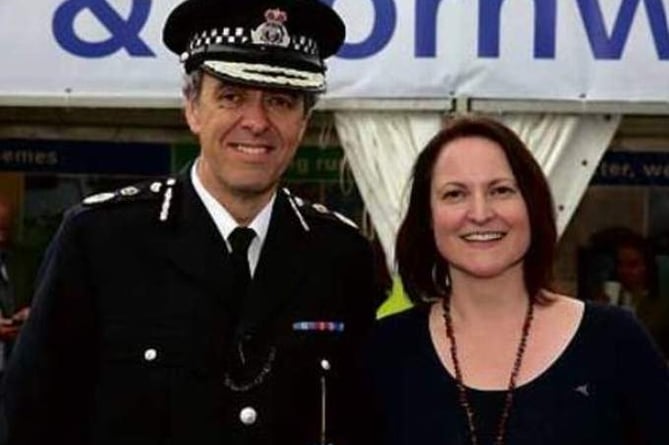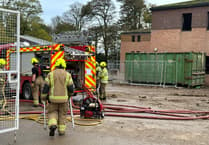Senior leaders from education, social services, the NHS, Local Government and emergency services were meeting together at today’s event as part of a partnership designed to tackle serious violence across Cornwall, Devon and the Isles of Scilly.
The Serious Violence Prevention Partnership (SVPP) was formed two years ago by Devon and Cornwall Police Chief Constable Shaun Sawyer and Police and Crime Commissioner Alison Hernandez in response to a rise in violence across the counties. The partnership is founded on the belief that violence is not inevitable - it is preventable through effective collaboration by public services, businesses, third sector support and public involvement in the solutions.
Funded by local council tax contributions via the Office and the Police and Crime Commissioner for Devon and Cornwall, the SVPP is taking a long-term approach to addressing the causes of violence by working with others to intervene early in the lives of those at risk of becoming involved in it.
It has already begun work with offenders, victims and young people as it seeks to achieve its aim of breaking cycles of violence which affect some communities over several generations. Alongside this, Devon & Cornwall Police will be conducting overt and covert operations focusing on the perpetrators of serious violence within communities, homes and online and those who bring violent crime into its communities from outside the force area.
The SVPP has already commissioned and acted on an expert study to better understand the causes of violent crime, has helped 108 young people at risk of becoming involved in violence, has aided victims by giving them greater access to restorative justice, has assisted young people who want to address their offending behaviour, and has helped others improve their communication skills – a proven method of addressing offending behaviour.
Today around 90 people from local authorities, the NHS and emergency services came together to discuss the partnership.
Chief Constable Shaun Sawyer said: “The communities of Devon, Cornwall and the Isles of Scilly have a strong and enduring history of supporting, nurturing and developing its children and young people to achieve their dreams, enjoy their surroundings and learn to become responsible adults. Yet this has not been, and increasingly is not, the case for a concerning number of young people.
“There is no one single cause - though chaotic home lives, increasing misuse of drugs and alcohol, generational poverty and online violence, exacerbated by the absence of positive adult role models, plays a significant part. Even so, we see children from stable backgrounds with much love and support in their lives led astray or actively groomed by other young people and adults.
“Young people should not be wrapped in cotton wool, but equally we all have a duty to watch out for and support them.
“The leading role of myself and the Force in combatting the most violent offenders is unequivocal, with the Crown Prosecution Service, in bringing them to justice before the Magistrates and Crown courts. The investments by local taxpayers and Government is already delivering far more proactive operations to target offenders and protect the vulnerable.
“People have already seen, and will see, far greater police presence and proactive operations across a number of crime types, notably drug misuse, knife crime and violence in the night-time economy. We are also targeting violence in the home and online and running joint operations with regional police forces and the National Crime Agency.
“The Commissioner is also investing in local community-based diversionary schemes and we are working with criminal justice partners in respect of community resolutions, which are proven to be the most effective interventions for the majority of young people, as a means to stop their journey into more serious offending.
“Prevention is the enduring solution to serious violence and generational violence, epitomised by the Serious Violence Prevention Partnership (SVPP).”
Devon and Cornwall Police and Crime Commissioner Alison Hernandez said she need not impress upon partners the devastating consequences of violence, adding: “The tragic murders of Bobbi-Anne Mcleod in Plymouth in November, and those of Maxine Davison, Lee Martyn, Sophie Martyn, Stephen Washington and Kate Shepherd in August, brought these issues into sharp focus but the truth of the matter is that violence blights lives every day in our society.
“We must persuade people that knife carrying, domestic violence and substance-related violence is unacceptable and reassure victims that help is on hand.
“Police cannot solve this problem alone and I am pleased that a new serious violence duty will soon require local authorities, the police, fire and rescue services, criminal justice agencies and health authorities to work together on an informed strategy for responding to violence.
“The partnership is funded locally here because, fortunately, we do not see the levels of violence here yet that attract central Government funding for this type of project. We want to keep it that way and this meeting is a significant step towards working with these organisations to assist them in working towards our common goal of making Devon, Cornwall and the Isles of Scilly safer for us, our children and our grandchildren.”
A Home Office study published in 2018 estimated that crimes against people cost the UK economy £90billion a year. Because of the higher physical and emotional costs to the victims of violent offences, these crimes were responsible for two thirds of that cost.
The Devon and Cornwall Serious Violence Prevention Partnership is receiving £4m over four years, from April 2020.
Devon and Cornwall saw a 47% increase in homicides between Sept 2019 and August 2021, with 37 in that period.
The Crest Advisory Strategic Needs Assessment commissioned by the partnership found in 2020 that across Devon and Cornwall reported violence with injury had increased 43% since 2015, despite a very slight decrease in 2019. The most prevalent violent offence was assault without injury, followed by assault with injury.




